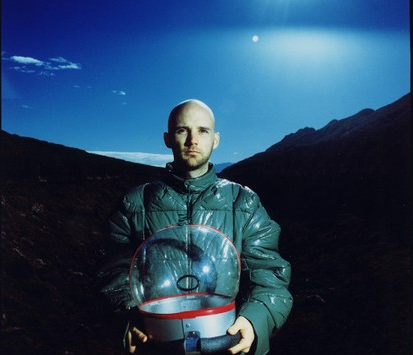1) We Are All Made of Stars; 2) In This World; 3) In My Heart; 4) Great Escape; 5) Signs of Love; 6) One of These Mornings; 7) Another Woman; 8) Fireworks; 9) Extreme Ways; 10) Jam for the Ladies; 11) Sunday (The Day Before My Birthday); 12) 18; 13) Sleep Alone; 14) At Least We Tried; 15) Harbour: 16) Look Back In; 17) The Rafters; 18) I’m Not Worried at All
Part an attempt to follow up on a hit, part an attempt to deal with tragedy. A confused but often beautiful collection of songs.
Key tracks: "Signs of Love", "Extreme Ways", "Harbour"
Most of Moby’s albums tend to follow one big musical concept or another, often explicitly stated in the liner notes that accompany each release. 18 is the outlier: despite being seemingly obvious about its angle at first glance, it’s a little bit more complicated and unclear than that.
The preceding album Play had hit it big, way bigger than anyone anticipated, and suddenly Moby had been thrusted into worldwide super stardom with countless new fans and casual appreciators. 18 should have been an easy victory lap. Instead, this was something the formerly eager genre-flipper Moby struggled to deal with. There were expectations now - both from the audience and the label - and he was a global superstar now. Moby mentions in the liner notes that he wrote over 80 songs for the album which is either a premium humblebrag or a sign of artistic desperation, writing things over and over while trying to figure out just how to respond to the sudden demand. In its core, it’s audible that 18 started out as a response to his sudden, hit-making reputation.
Then 9/11 happened. Moby was a proud New Yorker at the time and the incident hit uncomfortably close to home. He explicitly mentions the event in the liner notes and while it’s never referenced directly within the album itself, its shadow looms all over the album. Moby needed to write a big hit follow-up but he was still processing the tragedy and coping with the confusion and numbness of the aftermath. This inevitably ended up leaving its print on the subsequent writing sessions, with Moby now not only having to write for a new audience but trying to do it under a drastically different mindset.

Yet, it’s all filtered through that post-9/11 melancholy. The heart of 18 is an aching one and it rarely allows itself to smile with certainty. Where there is an energetic beat there’s undoubtedly also a beautiful, sad melody laid on top of it and as the album gets further, energetic distractions like “In My Heart” and “Jam for the Ladies” become exceedingly rare as the sad, mid-tempo atmospherics take over. “Extreme Ways” may be an attempt at a rock anthem but it’s resigned and weary, Moby desperately gasping out “then we fell apart” in its chorus and sounding completely detached and cold elsewhere. Moby’s attempt to find some meaning in tragedy breaks through any crack it can find within the songs, turning what sounds initially like another big hit follow-up into a strangely wistful set of songs.
All that leaves 18 a little confused itself and in fact, that’s become the album’s signature trait. No matter how you mix the tracks together or switch the way you view them, the songs on 18 just do not really gel together smartly. They’re too all over the place, trying to say a load of different things and uncertain of what to focus on. And there’s just too much of it - Moby’s never been much of an editor but at over 70 minutes long and spanning across 18 songs, the sheer amount of songs doesn’t help 18’s case. The thing is, the melancholy side of 18 is actually a really strong one, musically. The moodier second half is where the album really shines: the title track, “At Least We Tried”, “Harbour” (featuring the ever-powerful Sinead O’Connor) and “I’m Not Worried at All” are all superb, all wonderfully haunting, beautiful and almost tearjerkingly wistful. Add in a number of the stronger songs from the first half (“Signs of Love” and “Extreme Ways” in particular - the latter genuinely is a great song, partially because of its sheer melancholy) and you’d actually have a potentially incredible album of ache, loss and finding the light. As it is, that’s not what we really have, and I’m not really sure how exactly to define what we do have.

No comments:
Post a Comment